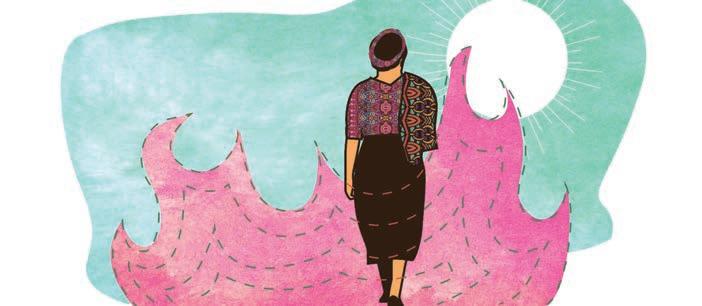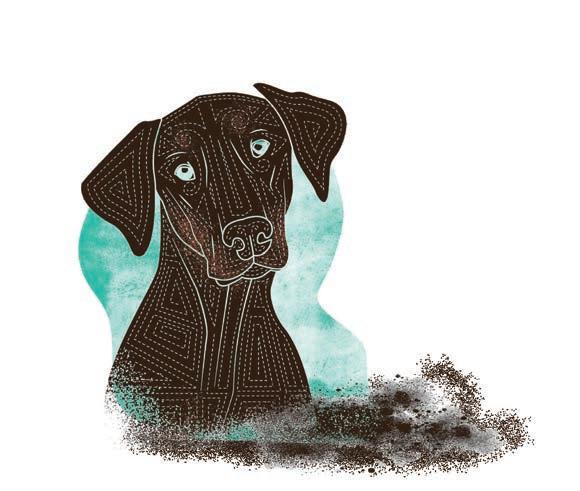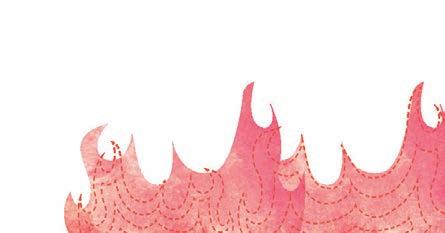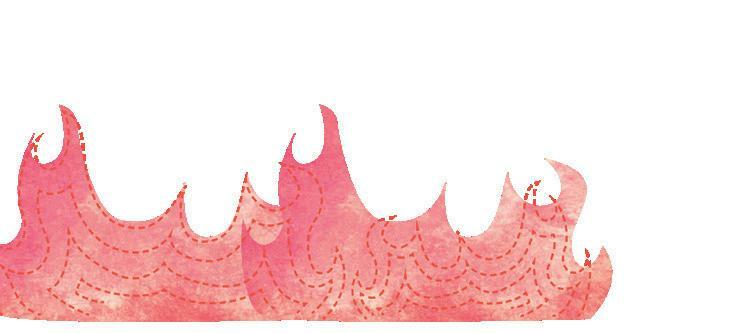
17 minute read
COVER STORY
Spring Poetry Search
FIRST PLACE
Advertisement
Folded Neatly, Ready to Go Home
By Carol Miller
Poetry echoing trauma takes center stage
How would you describe your feelings if you shouted inside a cavern, and hundreds of echoes returned ? And sonorous sounds filled the space? How would you depict the phenomenon itself, and describe your emotions? Breathtaking. Impactful. Touching. Overwhelming. The adjectives—no matter how many accumulate—say too little.
The dilemma is comparable to trying to express my feeling after receiving over 80 submissions following the call for poetry on the themes of history and trauma.
Before reading the poems, let’s review the contest guidelines. I asked for “poems dealing with a traumatic event that has a deeper history, so that the poem deals both with the present manifestation and the historical background. The traumatic crisis may be cultural, racial, sexual, gender-based, geographical, environmental, or anything else.”
Put another way—write me something about where historical tragedy ends, and your public or private story begins. Make me feel the weight of history.
In response I received an outpouring of rhyming, confessional and free verse and experimental poetry addressing (thematically) loss, dislocation, isolation, immigration, racism, love, family, guilt, memory and drawing (historically) on memories of the Holocaust, the bombing of Dresden, massacres of Native Americans, World War II battles, Japanese internment camps, Vietnam, Kent State and the killing of George Floyd, to name a few specific references.
I can’t humanly convey the similarities and differences in the submissions (because I can’t reprint them all.) But their emotional register hit me. The corpus hit me harder than any individual poem. I didn’t have to wade through the manuscripts, feeling tedium, or annoyance, so much as simply let them wash over me. There is an immense outpouring of goodwill in these poems. It proved impossible to remain unimpressed by the conscientiousness evident. In its own way, although I knew Santa Fe was a progressive city, reading so many meditations on ethics and history written (mostly) by local authors was an affirmation of human nature.
If you’re vexed because you submitted, but don’t see your poem printed here, then my advice is to study the chosen poems carefully. Study them for the values that struck me. And that you can incorporate into your next poem.
Note Carol Miller’s skillful use of silence in “Folded Neatly, Ready to Go Home.” Alejandro Jimenez’s layered unraveling of dislocation and memory in “Untitled Poem about Immigration” and Leslie Zane’s shrewd use of formalism (a formal villanelle) to contain timeless gravitas and topical events in “History Cannot Be Chiseled Away.”
I chose the prizewinners and honorable mentions that evoked history heavily enough for me to feel its import, but balanced inside the shapes, sounds and metaphorical veils of poetry. Enjoy.
—Darryl Lorenzo Wellington My huipiles are crying from the drawer. I can hear them in my heart. They want to go home.
I don’t know how to tell them the villages have been destroyed.
Daughters of the weavers walking two thousand miles. For a dream. For life.
Threads connect me to the hands of many women.
Each came from the maker. Or the sister mother neighbor. In a market or at the artist’s small home, made of dirt, like mine.
Stacked like beautiful gravestones, memorials to Mayan grief. Too precious to wear.
Rematriation is the dream. Each huipile gifted to a woman forced to run with only a pack too small for treasures.
Notes: The huipil (plural: huipiles) is a garment hand woven on a loom and worn by Mayan women. For the Mayan women of Guatemala, the woven design identifies which community they come from.
Carol Miller is a public health and social justice activist who has been living in a frontier mountain village in Northern New Mexico for 46 years. In addition to being a New Mexico community organizer, Miller has worked at every level of government: local, state, and federal all the way to the White House. Miller is dedicated to geographic democracy, the principle that social and economic justice must extend to the smallest and most isolated areas of the country. No community left behind.
Untitled poem about immigration
By Alejandro Jimenez
In the photo I am 3 years-old and off camera our dog a black and red dobermann without a tail that we nicknamed, mocho, was still alive.
He hadn’t eaten whatever made him start puking uncontrollably, which caused my grandmother to ask my uncle to put mocho out of his misery.
I stood atop the basurero as mocho’s lifeless body [now with a hole in its head] was thrown down the cliff into the river.
There was a lot of trash but mocho was the first dead dog [I had seen] in it. His body stopped rolling, belly up and over time I would watch the sun,
crows, insects, and other dogs uncover the pearly white ribs hidden underneath his black fur. I would make a habit of visiting mocho.
In the photo I am 3 years-old and I am smiling at the camera. I got a knife in my hand and I am cutting into the cake but I don’t remember eating.
Off camera the mandarina tree has not been cut down and the lemon tree is planted in a bucket. It was August, it was cloudy and
muggy that day. My grandmother threw water on the dirt floor to keep the dust from rising [onto my cake of course].
In the photo I am [mostly] complete. I’ve not met grief. It was the first time I met my mother [well, my first memory of her anyway].
In the photo I am wearing an all blue outfit [even then I disliked wearing all one color]. I remember feeling blue that day. I remember that I ran into the bedroom and hid
under the bed and my mother tried to console me but she was a stranger back then. I would not have a memory of her until I was 8 years old and I was standing on carpeted
floors and the smells in the house were all new [even the birdsongs needed translating]. I felt like mocho: belly-up, unable to shoo away the insects coming to nibble on my flesh.
Alejandro Jimenez is a formerly-undocumented immigrant, poet, writer, educator and avid distance runner from Colima, Mexico, living in Santa Fe. He is the 2021 Mexican National Poetry Slam Champion, a two-time National Poetry Slam Semi-Finalist (US), multiple time TEDx Speaker/Performer and Emmy-nominated poet, whose work centers around cultural identity, immigrant narratives, masculinity, memory and the intersections of them all. He is a TIN HOUSE Writers Workshop participant. His work has appeared in The Acentos Review, The Latino Book Review, As/Us Journal, Rethinking Schools and other publications. His self-published book, “Moreno. Prieto. Brown.” (2017), has sold over 2,000 copies and has been incorporated in curricula across various school districts.

History cannot be chiseled away
By Leslie Zane
History cannot be chiseled away, Remove the word “savage” but it’s too late, Monument toppled and people must pay.
Eighteen months, the plaza in disarray, Heroes, victims, all are considered great. History cannot be chiseled away.
Outsiders, non-natives, just punks who stray, Obelisk falls, past destroyed, headlines grate, Monument toppled and people must pay.
Plywood surrounding plinth now on display, We lament, argue, form councils and wait, History cannot be chiseled away.
A tri culture town with voices that sway, Rallies, opinions, citizens irate Monument toppled and people must pay.
Eighteen months is a long enough delay, Where this will end is a constant debate History cannot be chiseled away, Monument toppled and people must pay.
Leslie Zane has been writing for most of her life from NYC, to NM, to the Bay Area and back to NM. She currently tutors kids 7 - 14, in writing and reading, is an improviser with various groups, loves to hike, be inspired by Northern NM scenery and can be seen walking in and around town on most days. This poem is written in the traditional villanelle format.
a letter to hiromu arakawa
By Alexandra (Sasha) Weiss
i don’t know if you know how much fullmetal alchemist means to somebody like me, somebody who had to buy my life at the price of not quite limbs, at organs removed, to see somebody clutch incision sites when it rains to see nerve pain in action and shake at reminders of what happened, of the family curse. my body, too, is a site of bargaining, my aunt’s life for ours, maybe my organs, maybe, if i do it right, will protect me, and maybe, if it happens to me, maybe my sister will be safe somehow. i know it’s not how it works but maybe i can dream it into being, her genes unbroken, only once in a pair of siblings when my dad and his sister were not so lucky. what happened to us is a fluke unrelated to the genocide of our people, it came from my goyish father not my jewish mother and yet. it’s still talked about like we did it to ourselves, the “jewish genetic diseases,” not like we were the blood making the city move not like we were used and spat out not like we were killed not like genocide is a genetic bottleneck and yet. i am a jew and i have a brca mutation and it is a coincidence. and yet there’s a curse in my family’s dna reflecting the bloodshed. it came from the side of my family with people who did it, who flew the planes, not the side with victims whose names i’m scared to ask even though i need to know because i have their blood and they are alive in me alongside fragments of the wrong side and the aunt i didn’t speak to who bought my life with her own and i don’t want my body back, i just want my sister to be able to let this all go like rainwater washing the gutter like dreamless sleep like shed skin cells like double stranded dna breaks.
Alexandra (Sasha) Weiss is a writer, gardener and academic. Sasha edits for Another Chicago Magazine and has work in or forthcoming in Death’s Dormant Daughter, Corporeal, Cicada’s Lament and elsewhere.

Getting Over
By Flavian Mark Lupinetti
The fellow from the think tank says America must take action. The man says we must get over this war as we got over Vietnam.
On a wall of black granite in Washington, on panel number twenty, east side not west, on line 102, a boy’s name is carved.
The boy spent eleven months In Vietnam. If he had survived one more he would have come home.
When that carving has been effaced, when that boy walks the earth, when he becomes as old a man as I am, when we sit on the porch drinking quarts of Iron City like we used to, when we talk about the old times . . .
Flavian Mark Lupinetti is a poet, fiction writer and cardiac surgeon. His work has appeared in About Place, Barrelhouse, Bellevue Literary Review, Briar Cliff Review, Cutthroat, Flint Hills Review, Sport Literate, and ZYZZYVA. He lives in Santa Fe.

Prescribed Burn at Aztec Springs
By Gregory Berg
Not a watering can, a drip torch. Same metal shape with balance in hand: 50/50 gas and diesel.
Slight tilt, fuel to wick, steady drizzling fire. Benzene soaking leaf litter, roots, fungi. Optimum conditions for the mosaic burn pattern.
Generations of nest, now kindling. Little roasted voles, red sizzling berries, smoke in the eyes of a lumbering dove.
Homes of bark and stem, burrows of duff turned to ash.
Thirteen million square feet at Aztec Springs. Six hours without refueling.
If the world were turned upside down, rabbits would be falling into fire.
Gregory Berg is a poet, book artist and photographer living in Santa Fe, New Mexico. He is the author of “The Hiker & the Blaze,” a collection of poetry and artwork about the relationship of man and the natural environment. His handmade books and fine art photography have been in juried exhibitions and are held in private collections.
Unexpected Costs of Life Expectancy
By Richard Sober
There’s a price on my head. My budget, if I ever had one, did not include living to age eighty-six. Did not include price of rent or mortgage on being out of my reach. Did not include the quantity of my vices, my un-publishable habits, my bad days, days of soaring eagles, racing heart, aching head, foot throbs, heart throbs, nights of serious drinking, sleepwalking, nightmares, inferior architecture of being a man, hernia repair mesh imploding, the penalties and rewards of daydreaming, miscalculations of actuaries, mishaps, surgical malpractice, not enough water, too many muffins, too many friends dying off before we had a chance to say goodbye. Not only that, but, the long road my family took to get here, crooked highway of wandering Jews. My grandmother’s first husband’s head cut off by a Cossack on his way home from work. The secret arguments, slammed doors, red faces after her bouts of electroshock therapy, a family simultaneously absent and overbearing, exhausted parents, a brother out of his body, me, trying to be out of my body, soap operas, the American Dream dragged through the streets like a defeated, captive enemy. The simple oddness of sitting in the third row of a church, watching a priest gently pour water on the head of my grandson. Watching the streams, as if the back of his head was a fountain, silently flowing into a glass bowl, priest and grandson dressed pure as snow, soft echo of Jewish grandfather slipping down the side aisle.
Richard Sober conceived this poem during and after attending his grandson’s baptism, he writes, “as I was remembering the story of the decapitation of my grandmother’s first husband.” He is a painter and poet, worker in both fields for 50-odd years.

Camino Real

By Richard Sober
I walk on old dirt, a place weighed down with ancient myths, people I’ll never know. Pains I’ve never had walk with me through this nowhere everywhere, this holy site made unholy by those of us who choose to call this place home. I walk hills above a town held in a mountain’s hands, made nameless by so much naming, made almost human, millions of footprints stirred in with rain, snow and wind.
A long time ago a coyote killing sheep woke us in the middle of night. There was a terrific storm afterward. Walls lit up with lightning. We tossed and turned. The ground was still damp in morning. A car was stuck in the flooded arroyo west of the room where we slept. Eroded mesas around us spelled a heavy dose of silence we had never heard before.
Men I worked with decades ago asked me to come down to this part of the world where they squatted half the year. I never did, until decades later. They are long gone, I am here. The winters are warmer and drier, old-timers pride themselves on “sticking it out, “ the town stretches further into the desert, the river is almost extinct, people don’t come and visit like they used to. Old friends don’t write so much anymore. We turn inward more frequently. A past spreads wider than a future. Some of us are already caught in its hallucinogenic net. So many eyes have seen this place. Sitting alone I feel a surge of possibility in this vast confluence with time. This morning I saw a woman in a Mexican dress, ornate flowers on a black field, pushing a rickety stroller with two Chihuahuas under a blanket. Her black hair brushed close to her skull. She talked to the dogs. She walked the narrow royal road, looking straight ahead. When I looked back she was gone.
Sober wrote this work after seeing someone walking her dogs on Agua Fria. The artist recently completed a series of paintings entitled “River” and writes that he is “considering making an altarpiece without any religious value.”
Returning a Child to the Rez
By Mary Strong Jackson
We drive under a dreamer’s sky the whitest of clouds plumped and placed in a precise hue of prairie blue in what might be entry into a sweet town where men in overalls stand with hands in pockets talk of rain and when the wheat will be ready to cut
instead it’s Whiteclay, Nebraska the 2nd of the month checks have come in bodies are strewn like discarded bottles of beer broken leaking some face down on the street some braced in doorways “they’d get it somewhere and if they had to walk further there’d be more dead on the roads” say the sellers of beer in Whiteclay
population 14 2 miles from the dry reservation 4 establishments sell beer just 4 just beer 3 to 4 million cans a year 10 to 13,000 a day sold to the 28,000 Native Americans from Pine Ridge Reservation, South Dakota
Skinny little Angie Eagle Star wakes to meet my eyes in the rear-view mirror “Wanna stop for a coke?” “No,” I say “Scared?” “No. We can stop” “Never mind,” she says
Sorrow seems to steam from the streets rising like heat my vision feels wavy the way mirages appear on oiled country roads in July
Angie leans over the seat to whisper “I’m almost home!” miles away from the white house white fenced foster home of cut lawns and leashed dogs back to cars that take 4 Hail Marys to start where sunlight wind and snow comes in around door frames and windows where Auntie Sue will gather all their blankets and coats to wrap the two grandpas and two children and herself not a popcorn cozy warm
but so they will not freeze so they will not die and be dead like Angie’s father hit by a car on his way home from Whiteclay Angie’s one memory of mother is her yellow death skin or Auntie Sue’s babies 1 and 2 and 3 dead like other cousins in car wrecks or her sister who hanged herself after the 3rd rape from white men who come to the rez to get away with it
Auntie Sue brings me inside her dirt-floored house bare wood walls one page from a coloring book hangs near the door the child beside her holds her returning cousin’s arm as if never to let go two old men watch a small TV there are no rooms just quilts covering places to sleep and two hard-backed chairs
I sit in one and explain paperwork to Auntie Sue who speaks aloud the names of those gone tells the agony of a family tree made of dead branches Sue says, “It’s the funerals all those funerals made me give up beer long ago.”
Gracious Auntie Sue sees me to the door does she know her life expectancy is 52 outside under that perfect hue of prairie blue we say goodbye I step into my car
seats with no holes the engine starts on first try my sleek black traveling mug fits in the cup holder I’ll drive to my small stucco house where my two dogs wait in a grassy yard with cactus wildflowers and garden tomatoes
An exit out of my country into my country a feel of and stink of wealth on my skin in my gut under a hue of prairie blue
Note: In 2017, the 4 liquor stores in Whiteclay lost their licenses and the town ceased to supply alcohol to the reservation.
Mary Strong Jackson’s work has appeared in journals and anthologies in the United States and England. Her chapbooks include Dreaming in Grief, From Other Tongues, The Never-Ending Poem by the Poets of Everything, Witnesses, No Buried Dogs, Between Door and Frame and Clippings. She resides near Santa Fe.
May 4, 1970 This summer I hear the drumming
By Flavian Mark Lupinetti
On the day of the shooting Greg called his Aunt Tillie. Only after she reassured him that his cousin Jean already left campus for the semester did Greg agree to honor our plan to skip school, collect enough from the guys to hit Ray’s party store for a case of Stroh’s, and meet at the creek to blow off the afternoon.
Charging sixty cents a quart, Ray’s wasn’t the cheapest place to buy our three-point-two beverage of choice, but it was the one that didn’t hesitate to sell to sixteen-year-olds. Only the older dudes could arbitrage the cheaper suds from Kroger’s, buying low and selling high, sometimes making enough on big party nights that they could drink for free.
The next day at school Greg wore the college T-shirt Jean sent him for his birthday on which Greg penned four bullet holes. When Mrs. Landry our guidance counselor saw the shirt, she said to Greg, “They should have shot more.”
SFR Spring Poetry Search winners share the stage with Santa Fe Poet Laureate Darryl Lorenzo Wellington at Teatro Paraguas in honor of National Poetry Month during an event at 5 pm Sunday, April 3.







